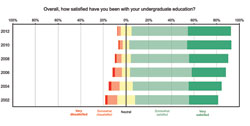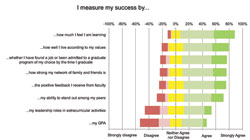
| Vol.
XXIV No.
5 May / June 2012 |
| contents |
| Printable Version |
Highlights from the 2012 Senior Survey
In late March 2012, MIT invited 1,047 fourth-year undergraduates (seniors) to participate in a survey that asked them about their satisfaction with various academic and non-academic experiences, perception of how their abilities changed while at MIT, and post-graduation plans. The survey closed in early May with a 73% response rate.
MIT conducts the Senior Survey every two years. This is the sixth administration. This particular survey is being administered simultaneously at a number of peer institutions.
Available at web.mit.edu/ir/surveys/senior.html are overall frequencies for each question on the survey, along with summary charts. (See also M.I.T. Numbers in this issue for additional charts.) Following are some of the highlights.
Satisfaction
- 88% of students reported being generally or very satisfied with their overall undergraduate education, slightly lower than in 2010. The chart below shows the results for this question by year.

(click on image to enlarge)
- In terms of the quality of the academic experience, 92% of seniors said that they were satisfied with opportunities to participate in research with faculty, 90% were satisfied with the out-of-class availability of faculty, and 93% with the overall quality of instruction. Satisfaction with academic advising received the lowest ratings in this group of questions, with 56% reporting they are generally or very satisfied. Seniors reported higher satisfaction with the quality of advising within their majors: 69% said they were generally or very satisfied.
- 82% of seniors reported that they were generally or very satisfied with their major(s).
- When asked about the quality of campus services and facilities, 95% or more of students said that they were satisfied with athletic facilities, classrooms, library facilities and resources, and laboratory facilities and equipment. Students reported being least satisfied with food services (36% were generally or very satisfied), followed by the administration’s responsiveness to student concerns (50% were generally or very satisfied).
Campus Life
- When asked their level of satisfaction with various aspects of campus life, the three highest-rated categories were the level of intellectual excitement on campus (96% generally or very satisfied), the feeling of security on campus (96%), and the opportunities to participate in intramural and other recreational athletics (96%).
- The lowest-rated categories were student government (44% generally or very satisfied), the sense of community on campus (70%), and the social life on campus (81%).
Skills and Abilities
- Students were asked to evaluate how much MIT had contributed to their knowledge, skills, and personal development in a variety of areas. They responded on a four-point scale: Very little or none, Some, Quite a bit, and Very much. This is a different scale than was used in prior years.
- The five top-rated areas were: Understanding and using quantitative reasoning; Thinking critically; Thinking analytically and logically; Understanding yourself: Abilities, interests, limitations, personality; and Ability to learn on your own.
- The five lowest-rated areas were: Reading or speaking a foreign language; Critical appreciation of art, music, literature, and drama; Placing current problems in historical/cultural/philosophical perspective; Writing clearly and effectively; and Constructively resolving interpersonal conflicts.

(click on image to enlarge)
Activities
- 88% of seniors reported having done research with a faculty member during their time at MIT.
- 70% had an internship in the U.S. and 30% had an internship abroad.
- The most popular extracurricular activities were miscellaneous student organizations and clubs (64% reported participating), volunteer service (43%), and intramural athletics (39%). When asked if they held leadership roles in any of these extracurricular organizations, nearly half of seniors responded that they had held a leadership role in one of the many “other” student organizations or clubs.
- 75% of students agreed or strongly agreed that they were able to find a balance between academic work and extracurricular activities, up from 72% in 2010.
Finances
- 58% of seniors reported that they did not personally borrow any money to finance their undergraduate education, up from 46% in 2010.
- 37% of students indicated that paying for their education had a considerable or severe impact on their family, down from 39% in 2010.
- When asked which activities they had to pass on due to a lack of money, nearly half of the respondents said they had to forego non-paying research or internship opportunities.
MIT-only Questions
- While the majority of the survey was part of a survey administered in concert with our peers, several questions at the end were MIT-specific questions and asked students about their sense of self, their aspirations, and more skills and abilities questions. A full list of these questions can be found at the end of the aforementioned overall results document.
- Students agreed most strongly with the following statements: I have friends at MIT with whom I can talk if something is bothering me; I am a capable student, at least on an equal plane with others; and I have a support network at home with whom I can talk if something is bothering me.
- The statements that received the lowest levels of agreement were: I measure success by my GPA; I measure my success by my leadership roles in extracurricular activities; and I measure my success by my ability to stand out among my peers.
- Students were asked how well their undergraduate experience prepared them to perform a variety of tasks on a scale of Very poorly to Very well. The task that received the highest ratings was: Deliver on all elements of a difficult job or project you agreed to do within the accepted time frame (67% saying More than adequately or Very well). The task with the lowest rating was Start a company (15% saying More than adequately or very well).
The Senior Survey was created and conducted by the Office of the Provost/Institutional Research. Text for this article was also provided by them. MIT is currently surveying the parents of MIT students about their perception of their child’s experience at MIT.
| Back to top | |
| Send your comments |
| home this issue archives editorial board contact us faculty website |